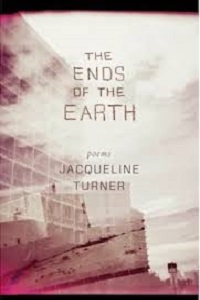
Jacqueline Turner. The Ends of the Earth. Toronto: ECW Press, 2013.
~Reviewed by Margaret Christakos
Jacqueline Turner’s poetics aggregate multiple speech acts of “wanting and knowing,” sometimes from the point of view of a contemporary biosubject much like herself—a critically engaged poet and prof to contemporary art students; a sexual woman; a mother of sons; an urbanite; a traveller—and sometimes from a projected pluralized public subject—a “me/you” with “our/your” speculations, inquiries, and injunctions, shipwrecked amidst the vortex of a culture stewing in its own excess-garbage and progress-exhaust.
Turner is interested in, and skillfully crafts, paratactic proximities that both surprise with their swivels among unlike subjective noticings and reassure with their bemused ennui that mirrors what seems to be an emotional survival kit for the sentient. Her interesting polyspeaker posts apostrophes to the future-in-process by turns from Olympic-readying Vancouver and from creative havens in Australia and Tasmania. Throughout, the voice/s are intimate, mildly despairing, mostly recognizant and relational. The voices probe and probate rhetoric itself in the era of online-affective economies, product sellspeak, common-sense banter, and education-industry-complex promises to a generation whose futures are best punctuated by Turner’s wry “interrobang”—a combination exclamation point + question mark that denotes a colossally poignant WTF. One section focuses on the figure of the castaway, riffing off of lost/rescued tropes from 18th/19th century Romanticism and from 21st century social search engines where the newly unpartnered navigate ongoing parenting advice and online infatuation simultaneously. Who knows where “we” are ending up?! These poems deliver a humane wallop to alert us to the self and the culture in crisis.
But scan the macrostructure of this book and find a refusal of elegy. The work beautifully sustains perceptivity and patience in imperfect grace with the recognition that the present is indeed under siege, so what else is new? We stride through a panorama of “integrated absences,” shaken monuments and scrapheap plastics, noting the damage, anticipating the eventuality of bearing forth. Turner erects an ironic portfolio of fanciful lectures directed at the massive construction cranes crookedly pulling up new urban blight all over Vancouver, tipping her hat to the resigned truism that progress buys out its own complicity “at the end of the day.” In the section “They Lie About the Weather,” a series of addresses to our climate debacle pitter pats with bemusement, for there’s some kind of disco tune that also permeates that blue mood on a grey morning. The Ends of the Earth—note the clever plural of “ends”—simmers and thrums with a tenacious commitment to how perpetuity and change unfold despite immobilizing odds; what keeps sweeping us up is Turner’s keenly present and intelligent subjective capacity to pivot, metabolize, and reassemble.
Margaret Christakos is the Toronto-based author of a novel and eight collections of poetry, including What Stirs and Excesssive Love Prostheses, facilitator since 2006 of Influency: A Toronto Poetry Salon, and Publishing Editor of Influencysalon.ca.
Explore wanting and knowing in Arc‘s poetry.

